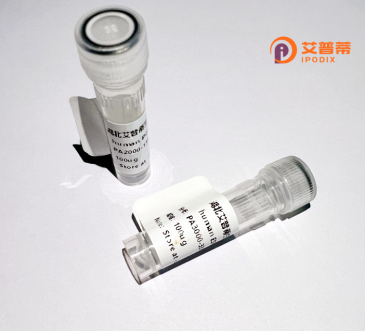
| 纯度 | >90%SDS-PAGE. |
| 种属 | Human |
| 靶点 | ARID4A |
| Uniprot No | P29374 |
| 内毒素 | < 0.01EU/μg |
| 表达宿主 | E.coli |
| 表达区间 | 1-1257aa |
| 氨基酸序列 | MKAADEPAYLTVGTDVSAKYRGAFCEAKIKTVKRLVKVKVLLKQDNTTQLVQDDQVKGPLRVGAIVETRTSDGSFQEAIISKLTDASWYTVVFDDGDERTLRRTSLCLKGERHFAESETLDQLPLTNPEHFGTPVIAKKTNRGRRSSLPVTEDEKEEESSEEEDEDKRRLNDELLGKVVSVVSATERTEWYPALVISPSCNDDITVKKDQCLVRSFIDSKFYSIARKDIKEVDILNLPESELSTKPGLQKASIFLKTRVVPDNWKMDISEILESSSSDDEDGPAEENDEEKEKEAKKTEEEVPEEELDPEERDNFLQQLYKFMEDRGTPINKPPVLGYKDLNLFKLFRLVYHQGGCDNIDSGAVWKQIYMDLGIPILNSAASYNVKTAYRKYLYGFEEYCRSANIQFRTVHHHEPKVKEEKKDLEESMEEALKLDQEMPLTEVKSEPEENIDSNSESEREEIELKSPRGRRRIARDVNSIKKEIEEEKTEDKLKDNDTENKDVDDDYETAEKKENELLLGRKNTPKQKEKKIKKQEDSDKDSDEEEEKSQEREETESKCDSEGEEDEEDMEPCLTGTKVKVKYGRGKTQKIYEASIKSTEIDDGEVLYLVHYYGWNVRYDEWVKADRIIWPLDKGGPKKKQKKKAKNKEDSEKDEKRDEERQKSKRGRPPLKSTLSSNMPYGLSKTANSEGKSDSCSSDSETEDALEKNLINEELSLKDELEKNENLNDDKLDEENPKISAHILKENDRTQMQPLETLKLEVGENEQIVQIFGNKMEKTEEVKKEAEKSPKGKGRRSKTKDLSLEIIKISSFGQNEAGSEPHIEAHSLELSSLDNKNFSSATEDEIDQCVKEKKLKRKILGQSSPEKKIRIENGMEMTNTVSQERTSDCIGSEGMKNLNFEQHFERENEGMPSLIAESNQCIQQLTSERFDSPAEETVNIPLKEDEDAMPLIGPETLVCHEVDLDDLDEKDKTSIEDVAVESSESNSLVSIPPALPPVVQHNFSVASPLTLSQDESRSVKSESDITIEVDSIAEESQEGLCERESANGFETNVASGTCSIIVQERESREKGQKRPSDGNSGLMAKKQKRTPKRTSAAAKNEKNGTGQSSDSEDLPVLDNSSKCTPVKHLNVSKPQKLARSPARISPHIKDGEKDKHREKHPNSSPRTYKWSFQLNELDNMNSTERISFLQEKLQEIRKYYMSLKSEVATIDRRRKRLKKKDREVSHAGASMSSASSDTGMSPSSSSPPQNVLAVECR |
| 分子量 | 142 kDa |
| 蛋白标签 | His tag N-Terminus |
| 缓冲液 | 冻干粉 |
| 稳定性 & 储存条件 | Lyophilized protein should be stored at ≤ -20°C, stable for one year after receipt. Reconstituted protein solution can be stored at 2-8°C for 2-7 days. Aliquots of reconstituted samples are stable at ≤ -20°C for 3 months. |
| 复溶 | Always centrifuge tubes before opening.Do not mix by vortex or pipetting. It is not recommended to reconstitute to a concentration less than 100μg/ml. Dissolve the lyophilized protein in distilled water. Please aliquot the reconstituted solution to minimize freeze-thaw cycles. |
以下是关于重组人富含AT的相互作用域含蛋白4A(ARID4A)的参考文献,简要列举如下:
1. **"Retinoblastoma-binding protein 1 (ARID4A) recruits histone deacetylase activity and synergizes with the oncoprotein AML1-ETO to repress transcription"**
*作者:Xiao, H., et al. (2003)*
**摘要**:研究发现ARID4A通过与Sin3/HDAC复合体结合,参与转录抑制。其与白血病相关融合蛋白AML1-ETO协同,通过组蛋白去乙酰化酶活性抑制靶基因表达。
2. **"ARID4A modulates DNA repair and genomic stability in breast cancer"**
*作者:Zhang, Y., et al. (2016)*
**摘要**:该文献揭示了ARID4A在乳腺癌中通过调控DNA损伤修复通路(如ATM/ATR信号)维持基因组稳定性,其缺失促进肿瘤进展和化疗耐药性。
3. **"ARID4A interacts with p53 to regulate p21 transcription and suppress tumorigenesis"**
*作者:Kim, J., et al. (2012)*
**摘要**:研究表明ARID4A直接结合p53.增强p21启动子活性,诱导细胞周期停滞,从而抑制结直肠癌的发生。
4. **"Loss of ARID4A expression drives epithelial-mesenchymal transition in prostate cancer"**
*作者:Chen, L., et al. (2018)*
**摘要**:研究发现ARID4A在前列腺癌中通过调控E-cadherin等标志物抑制上皮-间质转化(EMT),其低表达与转移和不良预后相关。
这些文献涵盖了ARID4A在转录调控、基因组稳定性、肿瘤抑制及转移中的核心功能,涉及与关键通路(如p53、HDAC复合体)的相互作用。
ARID4A (AT-rich interaction domain-containing protein 4A), a member of the ARID protein family, is a chromatin-associated protein implicated in transcriptional regulation and epigenetic modification. It contains a conserved N-terminal ARID domain that binds AT-rich DNA sequences, facilitating interactions with chromatin remodeling complexes. ARID4A is known to interact with the Sin3/histone deacetylase (HDAC) complex, contributing to gene repression through histone deacetylation and chromatin condensation. Studies suggest its role in cell cycle control, apoptosis, and cellular senescence by modulating pathways like the retinoblastoma (Rb) protein pathway.
ARID4A is linked to tumorigenesis, functioning as a potential tumor suppressor or oncogene depending on context. For instance, it is downregulated in certain cancers (e.g., breast, prostate) but overexpressed in others (e.g., melanoma). Additionally, ARID4A interacts with the tumor suppressor p53 and regulates p53-dependent transcriptional activity. Beyond cancer, it participates in metabolic regulation and aging, with murine models showing ARID4A deficiency leading to obesity and insulin resistance. Recent research also highlights its involvement in neurodevelopmental disorders and response to DNA damage. Despite progress, its precise molecular mechanisms and tissue-specific roles remain under investigation, emphasizing its potential as a therapeutic target in diverse diseases.
×